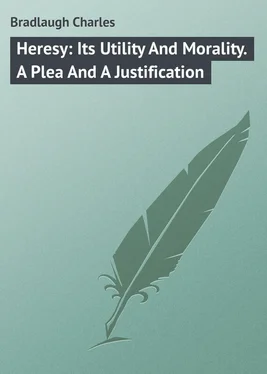Charles Bradlaugh - Heresy - Its Utility And Morality. A Plea And A Justification
Здесь есть возможность читать онлайн «Charles Bradlaugh - Heresy - Its Utility And Morality. A Plea And A Justification» — ознакомительный отрывок электронной книги совершенно бесплатно, а после прочтения отрывка купить полную версию. В некоторых случаях можно слушать аудио, скачать через торрент в формате fb2 и присутствует краткое содержание. Жанр: foreign_prose, на английском языке. Описание произведения, (предисловие) а так же отзывы посетителей доступны на портале библиотеки ЛибКат.
- Название:Heresy: Its Utility And Morality. A Plea And A Justification
- Автор:
- Жанр:
- Год:неизвестен
- ISBN:нет данных
- Рейтинг книги:3 / 5. Голосов: 1
-
Избранное:Добавить в избранное
- Отзывы:
-
Ваша оценка:
- 60
- 1
- 2
- 3
- 4
- 5
Heresy: Its Utility And Morality. A Plea And A Justification: краткое содержание, описание и аннотация
Предлагаем к чтению аннотацию, описание, краткое содержание или предисловие (зависит от того, что написал сам автор книги «Heresy: Its Utility And Morality. A Plea And A Justification»). Если вы не нашли необходимую информацию о книге — напишите в комментариях, мы постараемся отыскать её.
Heresy: Its Utility And Morality. A Plea And A Justification — читать онлайн ознакомительный отрывок
Ниже представлен текст книги, разбитый по страницам. Система сохранения места последней прочитанной страницы, позволяет с удобством читать онлайн бесплатно книгу «Heresy: Its Utility And Morality. A Plea And A Justification», без необходимости каждый раз заново искать на чём Вы остановились. Поставьте закладку, и сможете в любой момент перейти на страницу, на которой закончили чтение.
Интервал:
Закладка:
For those who do not believe this, I will instance two clergymen of the Church of England: one (who as my teacher when a boy) set a kind father's heart against me, and drove me further in heresy than I then dreamed of marching; and the other, who in cruel wickedness tried to wound me as a man through the feelings of my wife and children, whom he most vilely and basely slandered. The first is yet unpunished, the second escaped condign punishment only by writing himself down libeller, and praying pardon for the slanderous coinage of his brain. And yet this latter Church of England clergyman, who had written a strong letter thanking me for my generous forbearance, and who from his own pulpit pretended to express his sorrow, is actually the first and only man in my neighbourhood to cry "Atheist" against me, when I mingle in political life, and he thinks the phrase may wound and injure me.
CHAPTER II. THE SIXTEENTH CENTURY
It requires a more practised pen than mine to even faintly sketch the progress of heresy during the past three centuries, but I trust to say enough to give the reader an idea of its rapid growth and wide extension. I say of the past three centuries, because it is only during the past three hundred years that heresy has made the majority of its converts amongst the mass of the people. In earlier times heretics were not only few, but they talked to the few, and wrote to the few, in the language of the few; and indeed it may be fairly said, that it is only during the last hundred years that the greatest men have sought to make heresy "vulgar;" that is, to make it common. One of our leading scientific men admitted recently that he had been reproved by some of his more orthodox friends, for not confining to the Latin language such of his geological opinions as were supposed to be most dangerous to the Hebrew records. The starting-point of the real era of popular heresy may be placed at the early part of the sixteenth century, when the memories of Huss and Ziska (who had really inoculated the mass with some spirit of heretical resistance a century before) aided Luther in resisting Rome.
Martin Luther, born at Eisleben in Saxony, in 1483, was one of the heretics who sought popular endorsement for his heresy, and who following the example of the Ulrich Zuingle, of Zurich, preached to the people in rough plain words. While others were limited to Latin, he rang out in plain German his opposition to Tetzel and his protectors. I know that to-day, Martin Luther is spoken of by orthodox Protestants as if he were a saint without blemish, and indeed I do not want to deprive the Christian Church of the honour of his adherence; he is hardly good enough and true enough for a first-class heretic. Yet in justification of my ranking him even so temporarily amongst the heretics of the sixteenth century, it will be sufficient to mention that he regarded "the books of the Kings as more worthy of credit than the books of the Chronicles," that he wrote as follows: – "The book of Esdras I toss into the Elbe." "I am so an enemy to the book of Esther I would it did not exist." "Job spake not therefore as it stands written in his book." "It is a sheer argumentum fabulæ " "The book of the Proverbs of Solomon has been pieced together by others," of Ecclesiastes "there is too much of broken matter in it; it has neither boots nor spurs, but rides only in socks." "Isaiah hath borrowed his whole art and knowledge from David." "The history of Jonah is so monstrous that it is absolutely incredible." "The Epistle to the Hebrews is not by St. Paul, nor indeed by any Apostle." "The Epistle of James 1 account the writing of no Apostle," and "is truly an Epistle of sham." The Epistle of Jude "allegeth sayings or stories which have no place in Scripture," "of Revelation I can discover no trace that it is established by the Holy Spirit." If Martin Luther were alive to-day, the Established Church of England, which pretends to revere him, would prosecute him in the English Ecclesiastical Courts if he ventured to repeat the foregoing phrases from her pulpits. What would the writers who attack me for coarseness, say of the following passage, which occurs with reference to Melancthon, whom Luther boasts that he raised miraculously from the dead? "Melancthon," says Sir William Hamilton, to whose essay I am indebted for the extracts here given, "had fallen ill at Weimar from contrition and fear for the part he had been led to take in the Landgrave's polygamy: his life was even in danger." "Then and there," said Luther, "I made our Lord God to smart for it. For I threw down the sack before the door, and rubbed his ears with all his promises of hearing prayer, which I knew how to recapitulate from Holy Writ, so that he could not but hearken to me, should I ever again place any reliance on his promises." Martin Luther, with his absolute denial of free-will, and with his double code of morality for princes and peasants – easy for one and harsh for the other – may be fairly left now with those who desire to vaunt his orthodoxy; here his name is used only to illustrate the popular impetus given to nonconformity by his quarrel with the papal authorities. Luther protested against the Romish Church, but established by the very fact the right for some more advanced man than Doctor Martin to protest in turn against the Lutheran Church. The only consistent church in Christendom is the Romish Church, for it claims the right to think for all its followers. The whole of the Protestant Churches are inconsistent, for they claim the right to think and judge against Rome, but deny extremer Nonconformists the right to think and judge against themselves. Goethe, says Froude, declares that Luther threw back the intellectual progress of mankind by using the passions of the multitude to decide subjects which should have been left to the learned. I do not believe this to be wholly true, for the multitude once having their ears fairly opened, listened to more than the appeal to their passions, and examined for themselves propositions which otherwise they would have accepted or rejected from habit and without inquiry. Martin Luther's public discussions with pen and tongue, in Wittemberg, Augsburg, Liebenwerd, and Lichtenberg, and the protest he encouraged against Rome, were the commencement of a vigorous controversy, in which the public (who heard for the first time sharp controversial sermons preached publicly in the various pulpits by Lutheran preachers on free-will and necessity, election and predestination, &c.) began to take real part and interest; and which is still going on, and will in fact never end until the unholy alliance of Church and State is everywhere annulled, and each religion is left to sustain itself by its own truth, or to fall from its own weakness, no man being molested under the law on account of his opinions on religious matters. While Luther undoubtedly gave an impetus to the growth of Rationalism by his own appeal to reason and his reliance on reason for himself, it is not true that he contended for the right of general freedom of inquiry, nor would he have left unlimited the privileges of individual judgment for others. He could be furious in his denunciations of reason when a freer thinker than himself dared to use it against his superstitions. It is somewhat remarkable that while on the one hand one man, Luther, was detaching from the Church of Rome a large number of minds, another man, Loyola, was about the same time engaged in founding that powerful society (the Society of Jesuits), which has done so much to check free inquiry and maintain the priestly domination over the human intellect. That which Luther commenced in Germany roughly, inefficiently, and perhaps more from personal feeling for the privileges of the special order to which he belonged than from desire for popular progress, was aided in its permanent effect by Descartes, in England by Bacon, in France by Montaigne, and in Italy by Bruno.
Читать дальшеИнтервал:
Закладка:
Похожие книги на «Heresy: Its Utility And Morality. A Plea And A Justification»
Представляем Вашему вниманию похожие книги на «Heresy: Its Utility And Morality. A Plea And A Justification» списком для выбора. Мы отобрали схожую по названию и смыслу литературу в надежде предоставить читателям больше вариантов отыскать новые, интересные, ещё непрочитанные произведения.
Обсуждение, отзывы о книге «Heresy: Its Utility And Morality. A Plea And A Justification» и просто собственные мнения читателей. Оставьте ваши комментарии, напишите, что Вы думаете о произведении, его смысле или главных героях. Укажите что конкретно понравилось, а что нет, и почему Вы так считаете.












